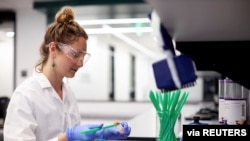Technology companies are raising hundreds of millions of dollars to develop farm products that use microbes and seaweed to grow crops. The move comes at a time when fertilizer prices are very high and increased attention is being paid to how food is produced around the world.
Biostimulants
Microbes, including fungi and viruses, have been available for years as treatments to protect plants from insects and disease, with mixed results. But developers are increasingly using them as natural ways to support crops while keeping up crop production levels.
The new microbial fertilizers are sometimes called biostimulants. Such products could help farmers use less nitrogen – a fertilizer that can pollute waterways and create nitrous oxide, a gas that has environmental effects. Canada wants to cut fertilizer emissions by 2030, while the European Union aims to reduce fertilizer usage.
Denmark-based Novozymes is one of the biggest sellers of biological agriculture products. One product contains a fungus that grows alongside plant roots and releases phosphate, a crop nutrient, from the soil. Yara International of Norway says its biostimulants are based on seaweed and other substances.
Another product from the startup Pivot Bio has microbes that take in sugar from the roots of corn, wheat, or sorghum plant, producing an enzyme that changes nitrogen to ammonia, a crop nutrient.
The California-based company says farmers use it on more than 400,000 hectares. It has also raised $430 million last year from investors.
AgFunder said investments in biostimulant and crop control products have more than doubled in 2021 from the previous year, to $777 million. And Rabobank expects the $3 billion biostimulants industry to grow by 12 to 15 percent each year over the next five years.
Unregulated industry
Microbial fertilizers are largely unregulated, with few studies on how effective they are at developing crops. And not everyone is convinced biostimulants work.
University of Minnesota soil scientist Daniel Kaiser tested Pivot's Proven product over the past two seasons. He used them on six areas with reduced nitrogen fertilizer treatments. But only one area showed an improved yield.
"With a lot of these (biostimulant products) the scientific principles are sound. But taking them from a concept to something that will work in the field, that's where they tend to fall apart," he said.
Currently, only a small number of American states require companies to supply data on the effectiveness of microbial fertilizers. And the U.S. Environmental Protection Agency has only issued draft guidance for public review. In Europe, the European Union will require data on biostimulants starting in July 2022.
I’m John Russell.
Rod Nickel and Karl Plume reported on this story for Reuters. John Russell adapted it for Learning English.
_________________________________________________________
Words in This Story
fertilizer – n. a substance (such as manure or a special chemical) that is added to soil to help the growth of plants
enzyme – n. a chemical substance in animals and plants that helps to cause natural processes (such as digestion)
unregulated -- adj. not subject to laws passed by the government about how something is done, made, processed, sold, etc.
yield – n. the amount of something that is produced by a plant, farm, etc.
principle – n. a basic truth or theory : an idea that forms the basis of something
concept – n. : an idea of what something is or how it works





